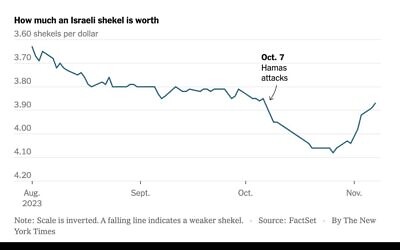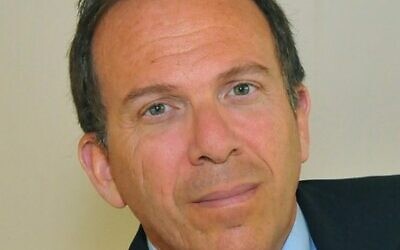Israel’s economy is bouncing back
The country's Central Bank has propped up the shekel after its initial dip when the war broke out
The Israeli shekel has rebounded back to where it was before the 7 October attacks after falling to an 11-year low.
Earlier this week, Israel’s Central Bank announced it had sold more than $8 billion to help protect the currency.
Following the announcement, the shekel rose as much as 1.1 per cent to 3.8467 against the dollar in Tel Aviv, virtually erasing the sharp depreciation when the day the war started. It fell for 14 straight days when the conflict began, and hit an 11-year low of 4.0855 per dollar late last month. The local currency has recovered the losses it suffered in the days after the war broke out.

Last month, Israel’s Bank of Israel governor Amir Yaron announced a plan to sell up to $30 billion in foreign exchange to shield the shekel from collapse amid the war. The program allows the Bank of Israel to intervene in the foreign exchange market during the war period to moderate volatility in the shekel exchange rate and provide the necessary liquidity for the continued functioning of the markets.
The Bank of Israel Research Department has revised its macroeconomic forecast in accordance with the initial information gathered since the start of the war, and the high uncertainty. Under the assumption that the war will be concentrated on the southern front during the fourth quarter of the year, GDP is expected to rise by 2.3 per cent in 2023 and by 2.8 per cent next year.
JP Morgan still expects Israel’s GDP to grow by 2.5 per cent this year and by two per cent in 2024.
Modi Shafrir, chief strategist financial markets Bank Hapoalim, told Jewish News: “The shekel was the worst performing global currency in October but since the beginning of November, is the best performing currency in the world.

“At the start of the war the Bank of Israel did a great job in stabilising the economy with its plans to sell foreign exchange.
“The shekel sharply appreciated after Nasrallah’s speech last Friday (Hezbollah leader Syed Hassan Nasrallah), which caused the market to assume that the war will be concentrated on the southern front during the fourth quarter of the year, and will not escalate in the north.
“Additionally, there is often a correlation between what’s happening on the Nasdaq and the shekel, so the sharp bounce in the Nasdaq last week has also led to the Shekel appreciation. Finally, there is a lot of talk that after the war the judicial reforms will be off the table, which has also resulted in the rise of the shekel.”

Asher Blass, owner of Economic Research and Consulting Group and former chief economist at the Bank of Israel, said: “Even when the shekel fell vis-a-vis the dollar in the first few days after the war broke out, it wasn’t such a dramatic fall – not like the Russian Ruble fell when the Russia-Ukraine conflict started – and this was also in part due to the dollar strengthening. But the shekel seems to have recovered suggesting that there wont be a foreign exchange problem, which can be seen as a vote of confidence in the Israeli economy .”
Meanwhile, Israeli tech stocks are posting strong gains in the wake of positive third quarter results. The short-term losses have reversed with value being created for investors in the long term.
Financial risk analyst Moody’s said “the economy has recovered relatively swiftly from past episodes of violent conflict and its dynamism benefits from a diversified high-tech sector as the main engine of growth.”
Earlier this week Palo Alto Networks agreed to buy Israel’s Talon Cyber Security just a week after it bought Israel’s Dig Security for $315 million. Both deals combined are believed to be worth around $1 billion.
Several other Israeli companies have led successful financing rounds including; Eleos Health ($40m, Series B, led by Menlo Ventures), Tabnine ($25m, Series B, led by Telstra Ventures), ReturnGO ($4.8m, Series A) and CannaSoul ($4m, Series A), according to leading high-tech research centre IVC Data and Insights.

Thank you for helping to make Jewish News the leading source of news and opinion for the UK Jewish community. Today we're asking for your invaluable help to continue putting our community first in everything we do.
For as little as £5 a month you can help sustain the vital work we do in celebrating and standing up for Jewish life in Britain.
Jewish News holds our community together and keeps us connected. Like a synagogue, it’s where people turn to feel part of something bigger. It also proudly shows the rest of Britain the vibrancy and rich culture of modern Jewish life.
You can make a quick and easy one-off or monthly contribution of £5, £10, £20 or any other sum you’re comfortable with.
100% of your donation will help us continue celebrating our community, in all its dynamic diversity...
Engaging
Being a community platform means so much more than producing a newspaper and website. One of our proudest roles is media partnering with our invaluable charities to amplify the outstanding work they do to help us all.
Celebrating
There’s no shortage of oys in the world but Jewish News takes every opportunity to celebrate the joys too, through projects like Night of Heroes, 40 Under 40 and other compelling countdowns that make the community kvell with pride.
Pioneering
In the first collaboration between media outlets from different faiths, Jewish News worked with British Muslim TV and Church Times to produce a list of young activists leading the way on interfaith understanding.
Campaigning
Royal Mail issued a stamp honouring Holocaust hero Sir Nicholas Winton after a Jewish News campaign attracted more than 100,000 backers. Jewish Newsalso produces special editions of the paper highlighting pressing issues including mental health and Holocaust remembrance.
Easy access
In an age when news is readily accessible, Jewish News provides high-quality content free online and offline, removing any financial barriers to connecting people.
Voice of our community to wider society
The Jewish News team regularly appears on TV, radio and on the pages of the national press to comment on stories about the Jewish community. Easy access to the paper on the streets of London also means Jewish News provides an invaluable window into the community for the country at large.
We hope you agree all this is worth preserving.






















